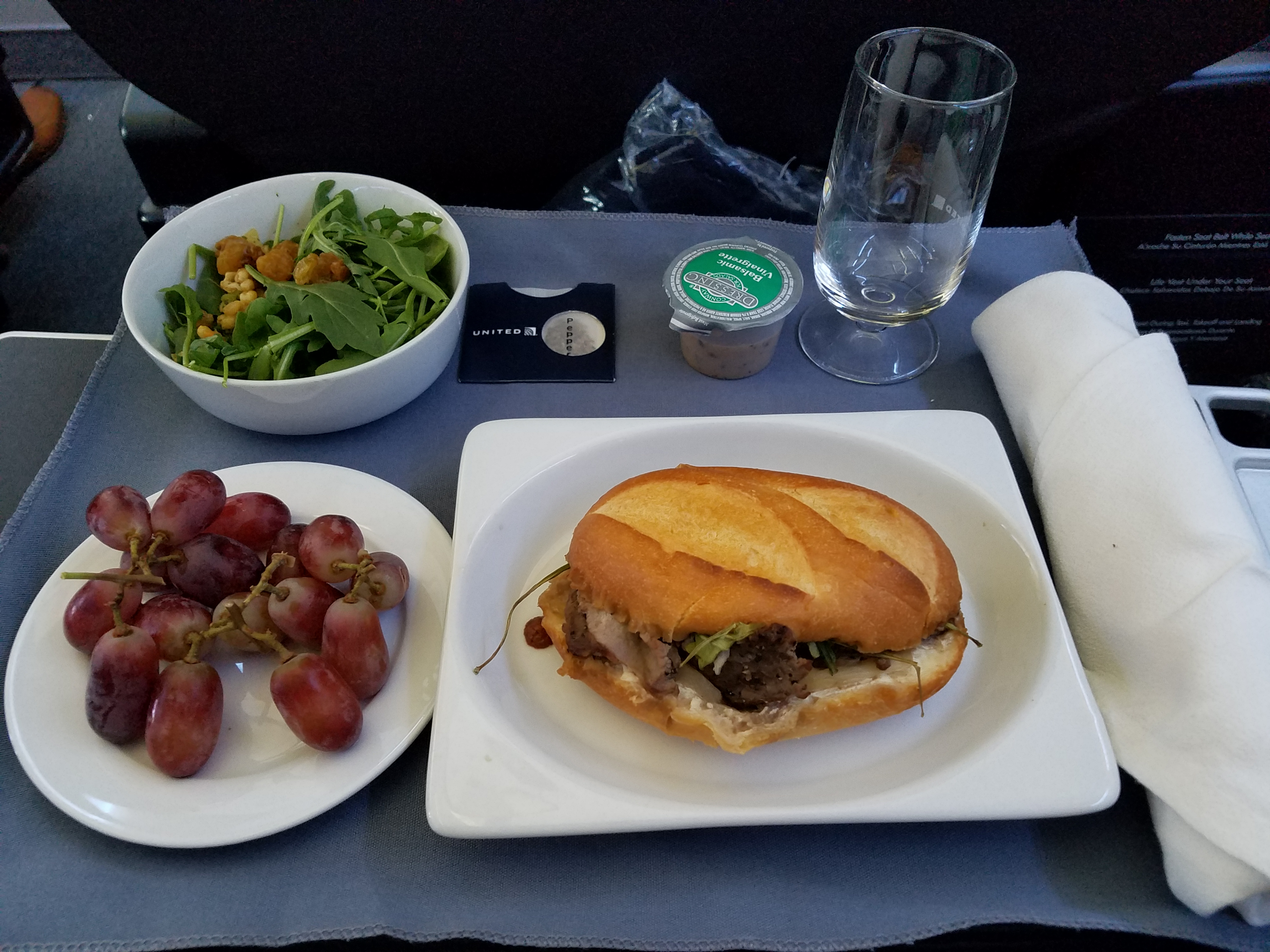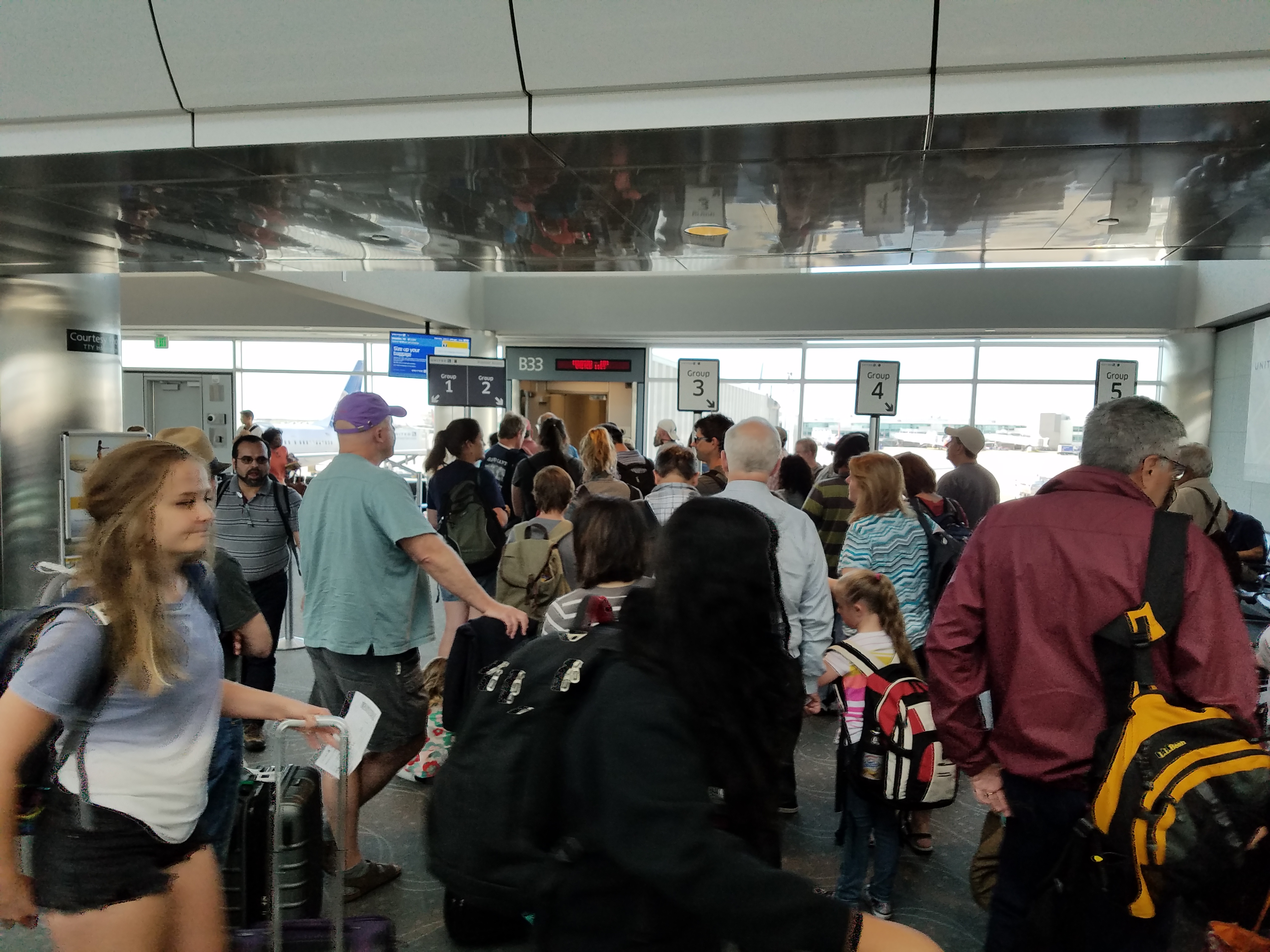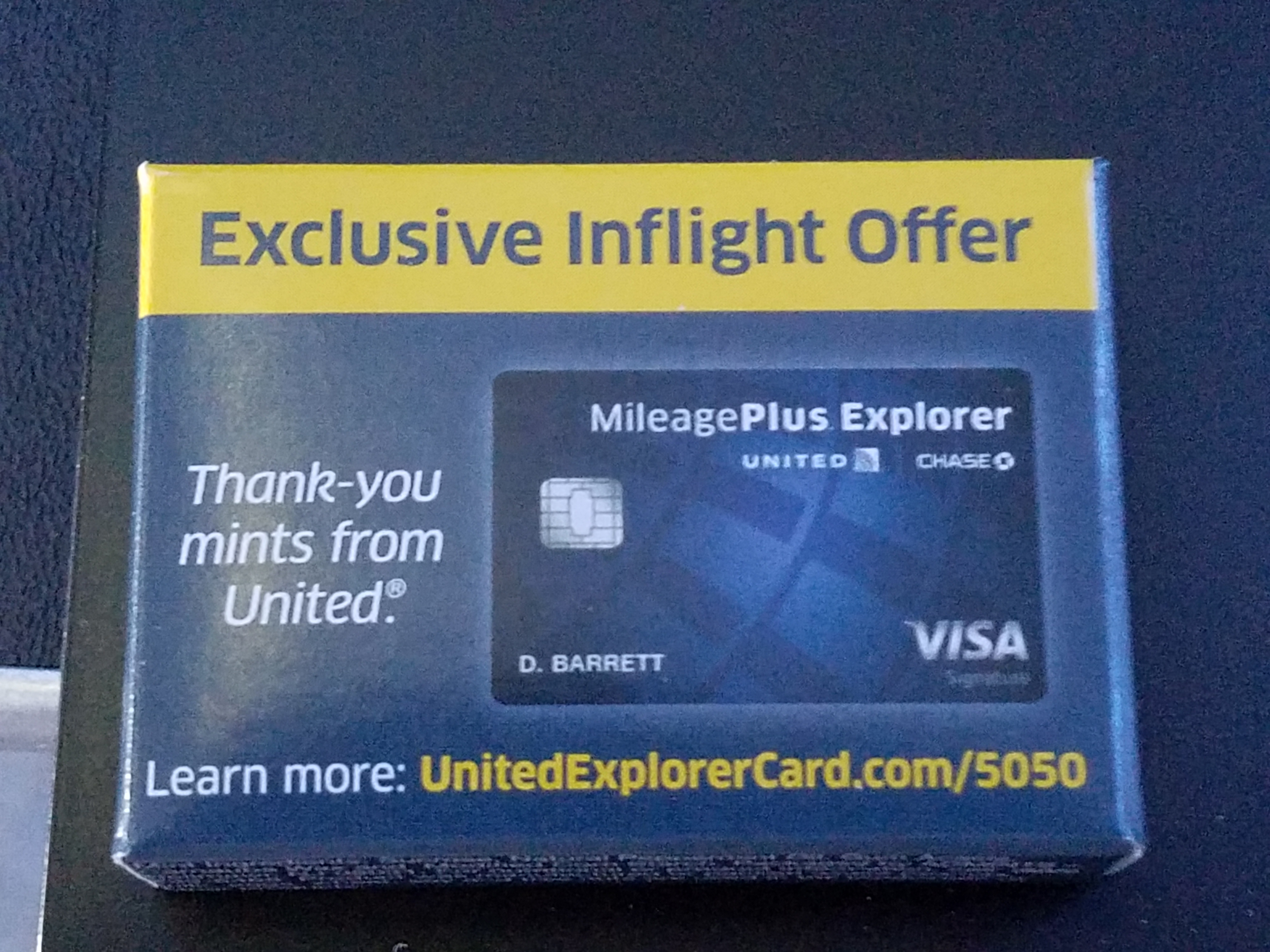I think that Scott Kirby destroys customer experience. Any investment that can’t be proven on a spreadsheet doesn’t get made or at a minimum is given short shrift in consideration.
At US Airways he tried several things that had to be rolled back like elimination of free water in coach, elimination of elite bonuses. They botched the America West-US Airways reservation system integration choosing the cheaper system. They eliminated first class meal service even on 3 hour flights.

United Airlines Lunch
He’s the one responsible for banning full-sized carry on bags on basic economy fares (at both American and United). He was the leader of changes at American Airlines after the US Airways merger, the reason we get a copycat of Delta and United for AAdvantage. And now he’s running United.
But no one is more interesting to listen to on earnings calls. He’s generally more candid than other executives, and extremely thoughtful.
United is Getting Ready to ‘Re-bank’ Hubs
United’s Houston hub re-banks October 29th.
One key factor in customers choosing an airline, after price, is total flying time. Shorter trips often show up higher in flight search.
So reducing connecting time doesn’t just get customers to their destinations faster when everything goes right, it also increases the likelihood that customers will buy from an airline. The challenge of course is when things go wrong.
The idea is that planes land and are turned around quickly. By compressing flight arrivals followed by departures you’re increasing the number of connections that appear to appeal to passengers.
- Compared to a rolling hub where flights arrive and depart evenly throughout the day this means more employees handling more passengers at peak times. It also means lulls at the airport where you’re paying those employees to wait for the next bank of flights.
- This approach more fully utilizes gates during peak times. During irregular operations it’s more likely to cause problems that cascade throughout the system, gates unavailable when planes don’t push back and planes therefore arriving without a gate. Shorter connection times mean more missed flights.
- Shorter connections also mean less airport shopping revenue for merchants, although there’s a drive towards app-based ordering of food in advance and delivery to gates at many airports which means less time is required for spending money at the airport. There’s less browsing though which does detract from retail sales. (By the way airlines take a piece of retail.)

United believes that re-banking their hubs will earn them greater market share. Kirby refers to ‘natural’ market share, the amount of business they’d expect to get not just in hub markets but also in smaller cities based on the number of desirable connections that can be offered to smaller city passengers.
Scott Kirby Thinks Re-Banking Hubs Sells Credit Cards
More and more there’s discussion of the importance of frequent flyer programs and credit card deals in driving revenue for airlines. Though I think Joe DeNardi is flat wrong on his valuation of the programs, since he and I differ on how much credit card revenue can grow in the future, the Stifel analyst is more responsible than anyone else in driving that shift in conversation.
During the third quarter earnings call Scott Kirby explained how he thinks re-banking hubs helps sell credit cards. If they can offer better connections to small city customers, those customers will fly the airline and be more likely to consider the credit card. If schedules don’t work for a passenger, the credit card is off the table too.

Kirby talks though in terms of a customer choosing “a different airline’s credit card” as though that’s the only option and not that he’s facing competition from Chase’s, Citi’s, and American Express’ premium card offerings whose points transfer to miles and travel rebate cards.
Devaluing MileagePlus Made It Into an Earnings Call
DeNardi then asked Andrew Nocella — who came over to United with Kirby — about the pending November 1 MileagePlus devaluation. He asked, how far can you push devaluations before customers don’t want the card?
Andrew Nocella’s answer is ‘some prices go down too’ (the expensive double and triple miles awards that most customers avoid may indeed become a little less costly sometimes, as well as more costly sometimes). I don’t think that reflects how customers see value in the program. If they did they wouldn’t get a United co-brand credit card earning 1 mile per dollar and redeeming those miles at a penny or less apiece.
Kirby Had to Do a Back Flip on Gulf Airlines
During a substantial portion of the call Scott Kirby spent time explaining how effective they’re becoming competing against ultra low cost carriers like Spirit.
Helane Becker from Cowen & Company tripped him up, but didn’t realize how much she had done so, when she asked then about competing against Emirates on Newark – Athens. Kirby was boxed into splitting odd hairs talking on the one hand how he can effectively compete against Spirit but not low fares from airlines he’s seeking government protection from.
Kirby started giving examples of other airlines they can compete with who aren’t subsidized and mentioned air berlin among them, suggesting their beef with Gulf carriers is subsidies not price. But of course air berlin had been subsidized for years by a Gulf carrier.
Becker then asked about subsidies to Chinese airlines, but accepted Kirby’s reply that they aren’t allowed to fly Newark – Athens (but United has gotten clobbered on their flights to secondary Chinese cities).
How Blog Posts Influence These Discussions
Airline executives read blogs. They can’t help it. People are naturally vain and we’re talking about them.
Corporate communications departments send out summaries of blogs and other media to executives, so even if they weren’t reading directly they’d see the discussions.
On today’s call Michael Sasso from Bloomberg asked about United’s business class product Polaris — delays in aircraft and seats and lounges — and highlighted discussion on these issues on blogs while United hasn’t really commented publicly.
Sasso asked was Polaris announced too early a point I’ve made for a long time but in particular a post Cranky Flier made the morning of the call. So Brett deserves a shout out.


It’s an unforgiving world out there. You can either copy your competitors and assume you’ll all achieve your “natural” market share since most travelers choose based on price, or you can try to innovate to create something better and risk screwing up and ending up in the unemployment line. I’d happily choose the same copycat path and deal with the quarterly investor call questions about it.
Most people paying to sit in business class on longhaul flights are not choosing a flight based on product or what they saw in a blog post. They’re choosing what is allowed in their corporate travel policy. People complain about the 8-across UA biz seats, but every time you are on one of those awful flights you are surrounded by paying customers.
You’ll never see me on an 8 abreast UA biz seat. In fact, you’ll rarely see me on a UA flight at all.
Thanks Scott Kirby and Jeff Smisek!
Do you think Munoz is just a figurehead at this point? It seems you ascribe every move to Kirby.
It would be a shame because the outsider perspective offered a chance at something different.
Kirby wasn’t at all “tripped up” by Becker’s comments, and I’m sure most folks other than you would understand why.
It’s relatively easy for UA to compete against airlines who are motivated by profit. UA has a formidable network and huge advantages in its hub markets. Good luck flying into EWR and “beating” UA.
The Middle Eastern airlines however aren’t motivated by profit. While other airlines receive government aid in one form or another (like some of the Chinese airlines), only the Middle Eastern airlines are so heavily subsidized that they fundamentally change the business dynamic and overwhelm UA’s competitive advantage. The difference in subsidy between a Chinese airline and a Middle Eastern airline is staggering — and completely distortive of the aviation marketplace. If your competitor is getting billions from their government, there is literally nothing you can do to effective compete in those markets. Nothing. Bother Kirby and Becker understand this. You should, too.
On united mileage plus rewards….
I have spent a very long time saving my miles to go to Santorini, Greece, (I live in USA). When i called about a week ago to book my flight on United, there was not one single seat available in may or june 2018!!!!
The representative on phone told me that United is focused on equity and not opening up seats for reward miles!!!.
They were very happy when i was spending my money using United’s credit card, now they want to punish me! Not only that, i hear United will be devaluing the rewards November 1st 2017, and this flight, if i ever get a seat…will cost me more!
This is outrageous it is also GREED plain and simple, there’s no other word for it!!!
If i ever get to use my rewards, i will never, ever get a United Rewards Credit Card again. I will take my business elsewhere!
Does anyone know what i can do about getting a seat on United Airlines for a return flight to greece using my rewards or is there some place that I can report this? I’m disgusted and extremely disappointed!
I’m not sure where you’re starting, but I see Newark to Santorini on May 4, 9, 10, 11 and June 12 (only one date in Business Class) and Santorini to Newark on May 6, 9, 11, 18, 21, 23, 25; plus June 8, 13, 20 and 27 (four dates in Business Class). Not amazing, but hardly “not one single seat”. Miles are best used with flexibility.
RJB – you are aware, right, that the 8-across United Business class product is only on legacy United equipment? Smisek was at Continental. Kirby only recently joined the company. Neither of them are responsible for that horrific product.
If United stays with chase as there banking partners and chase bank 5/24 rule this is gonna hurt your increase of customer pool. So the real question how long is United going to pair with that business model? thanks for your time